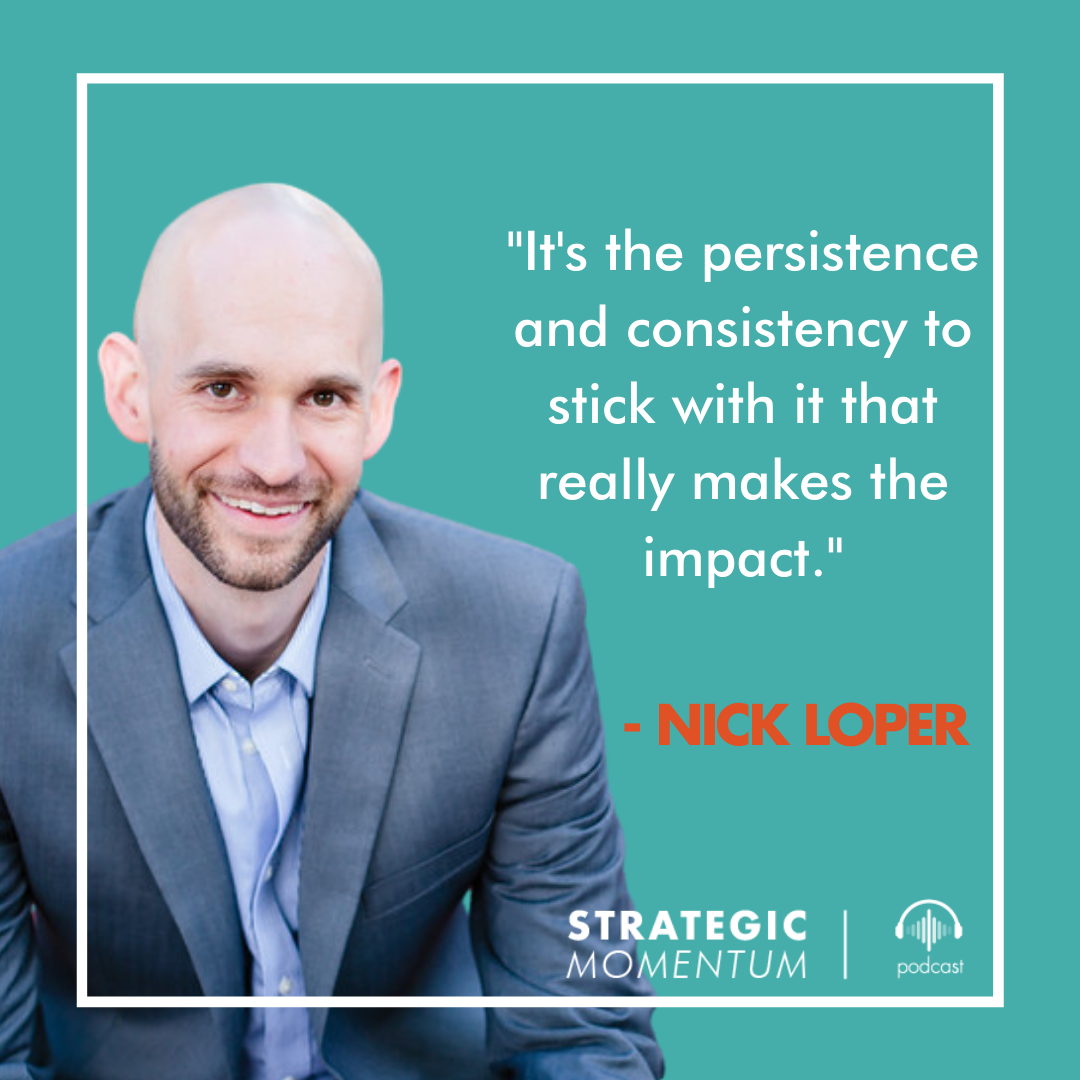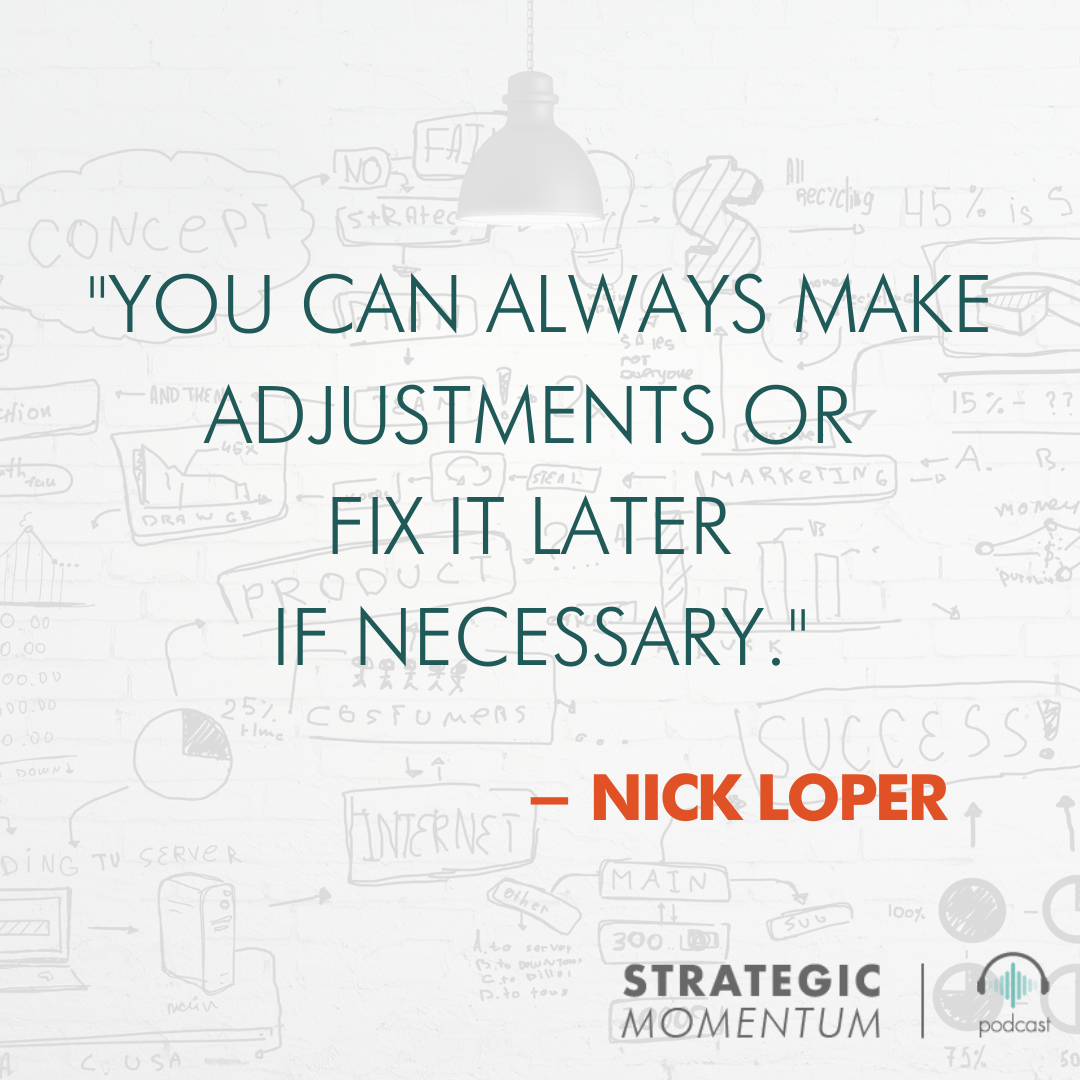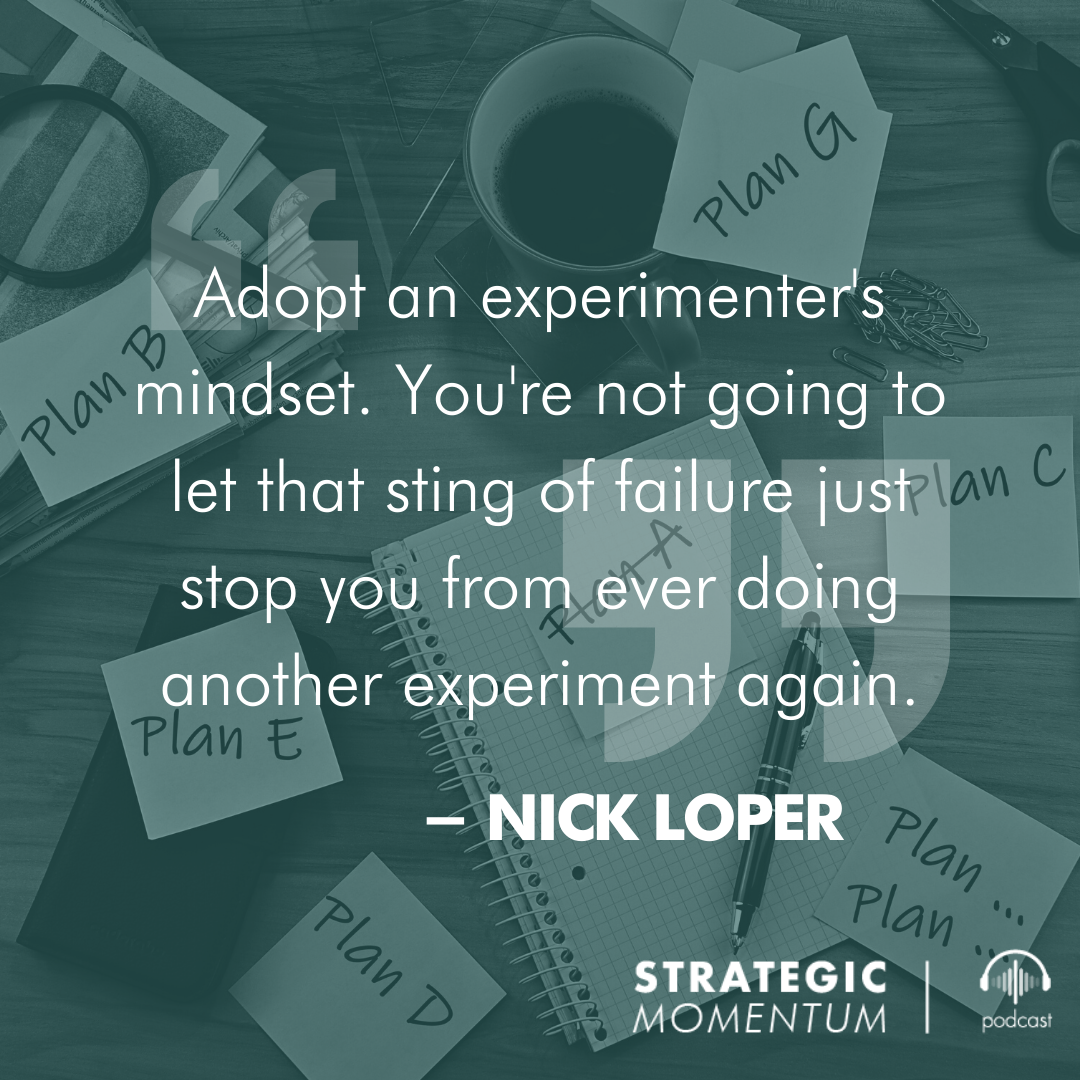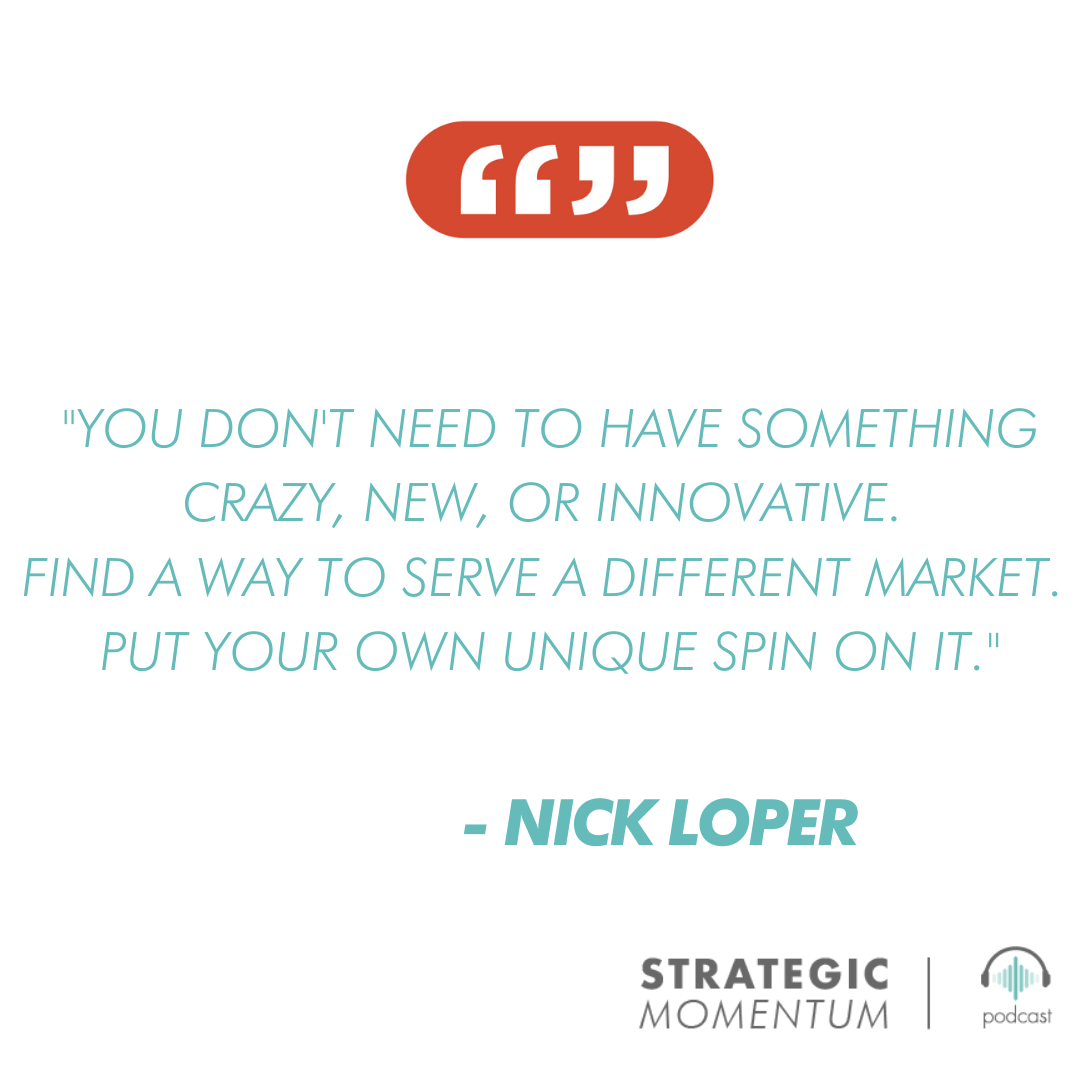Ep. 98 - Creating a Side Hustle to Build Momentum & Progress - with Nick Loper
Find Us Wherever You Listen To Podcasts
Nick Loper is an author, entrepreneur, and lifelong student in the game of business. He’s Chief Side Hustler at SideHustleNation.com, host of top-rated podcast The Side Hustle Show, and someone who is obsessed with progress.
Nick chose to pursue the side hustle life because he wanted freedom that the corporate life didn’t give him. While this is a path that many others are also interested in pursuing, others may choose to start a side hustle (or side hustles) on top of a day job to fulfill their long-term work-life goals.
So often, getting started can be the hardest part — but Nick shares how we can leverage side gigs and an experimenter’s mindset to make the first step easier on ourselves and move forward with confidence.
Career Success = Control and Experimenting Along the Way
Nick knew when he started his career that he didn’t want to climb the corporate ladder. He always viewed career success as the ability to control his calendar and make progress toward whatever new goals he has set, not constantly striving towards a better title and bigger paycheck.
He got that first taste of being in charge of his own destiny while he was in college, where he did an internship with a college painting outfit.
“They assign you a territory, assign you a zip code, and say, ‘All right, go paint as many houses as you can. We're going to teach you how to estimate jobs. We'll teach you how to get this stuff done. But have at it.’ And that was my first taste of working for profits and not wages, that was my first taste of really being in charge of my own destiny, rather than just punching the clock and collecting a paycheck.”
His next internship set him up for his first real side hustle post graduation — online marketing for an online shoe retailer when online shopping was still a new thing.
The skills and experience he gained coupled with the business success he achieved enabled him to create his first side hustle as an affiliate marketer selling shoes during nights and weekends, all while working his corporate job out of school.
But he didn’t do just one side hustle; he was parallel pathing many. The momentum and traction he gained from his many ventures allowed him to quit his full-time job, which spawned a continuous stream of other projects.
“Most of which, for full disclosure, were total flops, total failures,” Nick admits. “They died a quiet death in some dark corner of the internet. But a couple of those projects did stick around. One was a directory and review site for virtual assistants and outsourcing companies that was called virtualassistantassistant.com, which I just sold late last year. And the other one was the Side Hustle Nation blog and podcast, which started in 2013 and kind of has become the main focus of late.”
Nick’s continuous trial and error of various side hustles enabled him to create the successful mashup he has today. It’s through this continuous experimentation that he’s been able to figure out what he likes — and what he doesn’t — to find the combination that fits him best.
Why People Get Stuck: Coming Up With the BIG idea
The biggest barrier that prevents people from getting off of the sidelines and into the game is this idea that you need to have this brand-new, never-before-seen innovative business idea to get started. These ideas are often too heavy for liftoff.
In fact, it’s often riskier to start with a big swing. Instead, Nick suggests looking at where people are already spending money. Just take a look around the businesses in your town — how many dry cleaners are there? How many pizza, sushi restaurants?
If you can identify a need or pain point somewhere, if you can figure out a kind of business that already works, you can differentiate yourself or tweak the model in another way. Maybe there’s a way to take an existing business model and bring it to a slightly different market, new technology you can leverage to do something more easily, or you can execute a more effective marketing plan.
Nick’s book and podcast are full of dozens upon dozens of ideas you can riff on and stories that will help you figure out what a day in those shoes might be like.
The Experimenter’s Mindset: Getting Unstuck & Overcoming the Fear of Starting Something New
The fear of failure also holds a lot of people back from starting something new.
Getting started on anything different from the path that you're on, no matter what, is always difficult. We live in a culture where there's often an expectation of getting it right the first time, when in reality, things are always shifting and years of work go into every overnight success.
But if you can adopt Nick’s experimental approach to side hustles and life, it lowers the stakes and turns what could be a leap of faith into a dozen small steps in different directions. The Experimenter’s Mindset gives you the ability to test the waters, see what reaction you get (internally and externally), and constantly pivot toward something that fits better.
You don’t have to — and likely can’t — make this shift all at once. Think of adopting the experimenter’s mindset like going to the gym. If you start with small steps that are easily accomplishable, even as small as showing up at the gym, you start to develop a habit — and that quickly compounds on itself. But that consistency is key.
Figuring Out the How: The 3 Types of Side Hustles
Most of us have a pretty good idea about what we want — or, at the very least, what we don’t want — but it’s difficult to get clarity around HOW we make our life more meaningful or fulfilling.
A common piece of advice that you’ll hear when you’re stuck is to just do it, just start. And that’s not necessarily bad advice... but if you don’t have any ideas for the how, it’s just frustrating to hear.
One of the things I appreciate most about Nick and Side Hustle Nation is that he doesn’t just share what people have done to find success with various side hustles — he drills into how these businesses are built and what kind of commitment they require.
Nick outlines three broad categories of side hustles: product-based businesses, service-based businesses, and online or audience-based businesses.
Product-Based Businesses have a low barrier to entry. People often get started by selling things they already own and don’t need, learning some of the skills they need to sell online along the way. Then you may start selling things for other people and taking a commission, buying products low and selling high, or even working with a warehouse to market and sell your own product. And you can always reinvest your profits back into the business or sell the business after it’s up and running.
Service-Based Businesses have no barrier to entry and are quick to get started, but they also often have limited growth potential. The most common way to start this is to identify a skill you have that people will pay for and start freelancing, which can be anything from cutting grass to writing blog posts to teaching people how to use a new software product. Success in this space comes down to identifying a problem you can solve and a niche within that market. You can also adopt a drop servicing model, where you effectively serve as a matchmaker for someone else who has a skill or product. Nick offers the example of someone who leverages online marketing skills to get business for a local home cleaning service.
Online or Audience-Based Businesses have a higher barrier to entry and take longer to build, but they have unlimited ability to scale to exactly how much you want to invest into them. This is the content creation business: blogs, podcasts, YouTube, Instagram, TikTok. Whenever there is a new platform or technology, there is a new opportunity.
Finding the Side Hustle that Fits You Best (& Sticking to It to Make Real Progress)
A common piece of advice is to follow your passion or pursue something you love. However there can be instances where monetizing your passion can turn into work, shares Nick. He recommends starting with what you’re interested in because “passion often follows doing the work rather than the other way around,” and research from Dan Pink and Cal Newport backs him up.
For example, Nick’s first successful foray into side hustles was a sneaker business. He didn’t love sneakers, but he did fall in love with the process of optimizing the site and building workflows. He then carried those skills with him into more experiments and businesses.
Instead of chasing a passion, just ask yourself: does something about this interest me? It doesn’t have to be your undying passion.
It goes back to the concept of Optimizing for Interesting that Dorie Clark brought up in episode 97: We might not know what our passions are, but we know what our interests are. We can take some time to sample what's out there, learn about who's doing it, try something on for a little bit, see if it works, and continually optimize against it.
But if you ultimately want to achieve the right fit for you personally and professionally, no matter what that looks like, Nick says the biggest thing is persistence. Dorie talked about this, too, when she reminded us that it takes a long time to see signs of even minor progress — like two to three years long.
Those early metrics you get as feedback, the lack of web traffic or sales when you launch a new thing, can be discouraging. But that’s not failure and it’s not unique — behind every overnight success are years of effort, failures, and pivots.
Adopting the experimenter’s mindset, thinking of your side hustle as something to test and iterate upon, and can eventually become your career, can make persisting a lot easier because you get more small wins along the way and the misses don’t string (quite) as bad. Remember that creating a meaningful life is a long game.
The Power of Progress
A lot of businesses share income reports with their shareholders — but Nick shares a quarterly Progress Report with his community, Side Hustle Nation. And in his 2020 Annual Progress Review, Nick wrote:
“To me, progress means forward motion, or actively taking the steps to improve each day. It’s one thing we can control.
“Progress is universal; everyone can make progress toward their goals in some meaningful way, however small the steps may seem.”
I love that Nick chooses to share these reports. It's walking the walk, not just because he's growing his businesses but because he's living life with an Experimenter's Mindset, testing out a bunch of new experiments — those side hustles — and putting in a little effort every day to inch toward his version of success: control over his calendar and time freedom.
Because our goal, at the end of the day, should be to figure out what sort of life fits us best, one small test at a time. And the lessons that Nick shares through his community, book, and podcast are tools and tactics that anyone can use to iterate on a career mashup that reflects their whole self.
Career Advice:
Put it out there. You can always make adjustments or fix it later if necessary.
Key Takeaways:
Starting a side hustle doesn’t require coming up with a big bang idea. Building off of an existing business model, tweaking it in a different way like targeting a different audience or improving an existing approach, is a safer way to start and develop some new skills.
To break through your fear of getting started, adopt an Experimenter’s Mindset and approach. It’s not about perfection but rather trial and error to see what works and what doesn’t, lowering the barrier to getting started and the stakes of not hitting a home run every time.
There are three types of side-hustles that you can get started with: product-based, service-based, or audience based.
Product businesses involve selling a product, whether that’s something you already own or something you buy or something you create.
Service-based businesses essentially involve selling a skill you have or a solution to a problem you can solve. This involves any type of freelancing and some drop shipping models.
Online or audience-based are content creation businesses.
Finding that side hustle that fits you best doesn’t require turning your passion into a career. Rather start with something that you are interested in because passion often follows doing the work.
Passion for the process, as opposed to the product, will likely emerge over time. Or maybe you hate it — and that’s valuable data too.
Adopting the experimenter’s mindset to create a more meaningful life will only work with persistence, just like building up the habit of going to the gym.
To maximize the success with any side hustle, you have to do some planning and research. Study the dynamics of a space that seems interesting and figure out where you can play. It’s being strategic vs. just blindly doing it.
Resources
The Side Hustle Show: The Business Podcast You Can Actually Apply
Join the Side Hustle Nation FB Group
Check out Nick’s Quarterly Progress Reports
“Side Hustle Ideas To Financial Freedom with Nick Loper of Side Hustle Nation”











